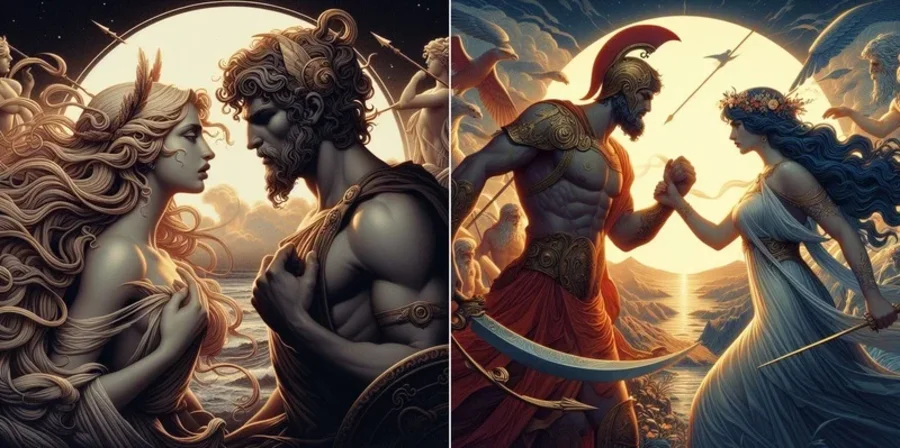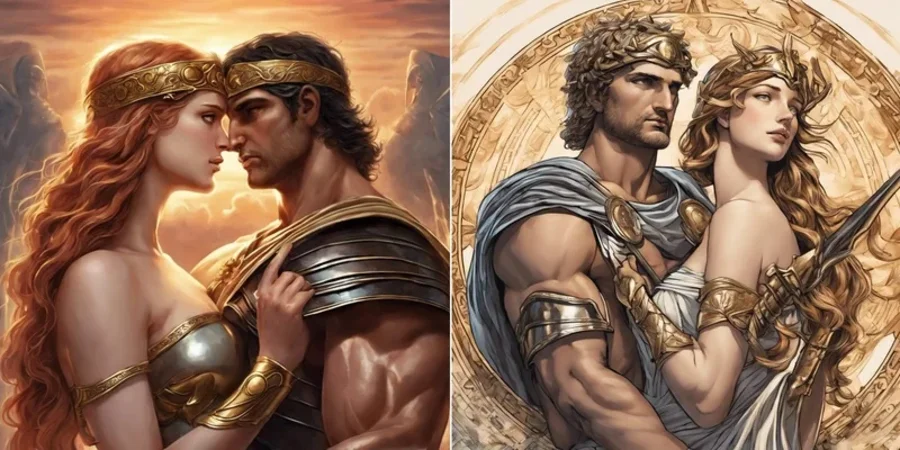
In Greek mythology, Aphrodite and Ares are two of the most prominent deities, representing the polar opposite aspects of love and war. Their relationship is the subject of many myths and stories that have captivated the imaginations of people for centuries. In this article, we will explore the story and myth of Aphrodite and Ares in Greek mythology.
Aphrodite, the goddess of love and beauty, is often portrayed as a sensuous and alluring figure. She was the daughter of Zeus, the king of the gods, and was married to Hephaestus, the god of fire and metalworking. Despite her marriage, Aphrodite had many affairs with other gods and mortals, including Ares, the god of war.
Ares was the son of Zeus and Hera and was known for his violent and destructive nature. He was often depicted as a brutal and aggressive deity who delighted in the chaos and bloodshed of war. His relationship with Aphrodite was one of passion and intense desire, representing the merging of love and war.
According to one myth, Ares and Aphrodite were caught in an affair by the god of the sun, Helios. Helios then told Hephaestus, who was furious at his wife’s infidelity. In revenge, he crafted an invisible net and caught the two lovers in the act, trapping them in a compromising position.
Hephaestus then summoned the other gods to witness his wife’s infidelity. They arrived and saw Ares and Aphrodite caught in the trap, with Aphrodite naked and ashamed. Despite the shame and ridicule that Aphrodite endured, she did not repent or show remorse for her actions.

In another version of the myth, Ares and Aphrodite were caught by the god of the forge, Hephaestus, in a golden throne that had been designed to trap them. The other gods were summoned, and they mocked the two lovers for their scandalous behavior.
The relationship between Aphrodite and Ares is often interpreted as a metaphor for the tension between love and war, beauty and brutality. They represent the two opposing aspects of human nature, passion and aggression, and the complex relationship between them.
Ares and Aphrodite children
In the realm of Greek mythology, the divine union of Ares and Aphrodite gave rise to a unique and enigmatic lineage: the Ares and Aphrodite children.
- Eros – The God of Love
Eros, also known as Cupid in Roman mythology, is perhaps the most famous child of Ares and Aphrodite. As the god of love and desire, Eros wields a bow and arrow, capable of making even the fiercest hearts succumb to love’s sweet influence. Eros represents the harmonious fusion of his parents’ domains, using his arrows to ignite passion and desire in both mortals and gods alike. His presence in Greek mythology underscores the inseparable connection between love and war, two forces that can either unite or divide.
- Anteros – The God of Requited Love
Anteros, Eros’ lesser-known brother, embodies a different facet of love. While Eros incites passion, Anteros represents the reciprocal aspect of love—requited affection. His name even means “love returned” or “counter-love.” Anteros encourages balanced, mutual affection, ensuring that love is not one-sided or fleeting. His existence highlights the importance of love’s mutuality in human relationships.
- Harmonia – The Goddess of Harmony
Harmonia, the daughter of Ares and Aphrodite, personifies the delicate balance between love and conflict. Her name aptly reflects her role in mitigating the discord often caused by her warlike father and passionate mother. She married Cadmus, the founder of Thebes, and their union was a symbol of the harmonious union between differing cultures and perspectives. Harmonia’s presence reminds us that love can bring peace and unity to even the most tumultuous situations.
- Phobos and Deimos – The Twin Gods of Fear and Terror
In stark contrast to the gentle Eros and the harmonious Harmonia, Ares and Aphrodite also gave birth to Phobos (Fear) and Deimos (Terror). These twin gods personify the darker, more destructive aspects of war. They accompanied their father Ares into battle, striking fear into the hearts of mortals and gods alike. While they may not embody love, they are essential aspects of the complex nature of warfare, reminding us that war often engenders fear and suffering.
Despite their scandalous affair and the ridicule they endured, Aphrodite and Ares continued to be one of the most enduring and iconic couples in Greek mythology. They represented the power of love and desire, even in the midst of conflict and violence.
Their love affair was also a reminder of the complexity of human emotions and the interplay between them. It is a testament to the enduring power of love and desire, even in the midst of the most challenging and difficult circumstances.
Frequently Asked Questions
Did Ares love Aphrodite?
Ares was infatuated with Aphrodite’s beauty and charm, and he pursued her relentlessly. Aphrodite, in turn, was drawn to Ares’ strength and masculinity. Their interactions often resulted in scandal and drama among the other gods and goddesses of Olympus.
However, whether Ares truly loved Aphrodite in a deep, emotional sense is unclear. Their relationship seems to be more driven by physical desire, passion, and the thrill of forbidden love rather than genuine emotional attachment.
Are Aphrodite and Ares married?
While not married to Ares, Aphrodite was entangled in a passionate relationship with him. Their relationship was shrouded in secrecy and forbidden desire, as they indulged in their passionate affair behind the back of Hephaestus, Aphrodite’s lawful husband. The union between Aphrodite and Ares symbolized the merging of love and war, two powerful forces that often intersected in the human experience.
Why did Aphrodite love Ares?
It’s difficult to say definitively why Aphrodite loved Ares in Greek myths. The stories don’t delve into their emotions in a way that directly explains her attraction. However, we can explore some possibilities:
- Opposites Attract: Ares, the god of war, embodies raw power and aggression, while Aphrodite represents beauty, love, and pleasure. Their contrasting natures might have fueled a certain allure for each other.
- Passion and Danger: Perhaps the thrill of a passionate affair with a dangerous god like Ares appealed to Aphrodite. The secrecy and risk surrounding their encounters could have added an exciting spark to their relationship.
- Strength and Masculinity: Maybe Aphrodite found Ares’ strength and masculinity attractive, a counterpoint to her own domain of love and beauty.
- Unexplained Connection: There could be a deeper, unexplained connection between them. In some myths, they are simply said to be drawn together by fate or the will of the gods.
Comments
Leave a Reply
You must be logged in to post a comment.
Dude, Aphrodite and Ares? That’s like, the ultimate power couple in Greek mythology! Love and war all wrapped up in one epic story.